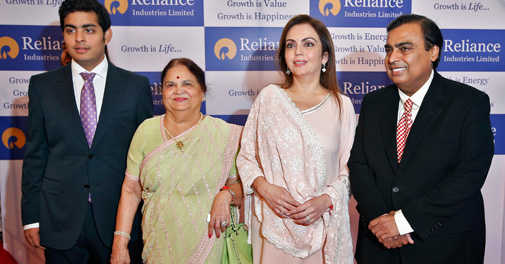The petroleum ministry would obey the Supreme Court order in its arbitration case against Reliance Industries Ltd on a pricing dispute from oil and gas fields, a senior official said on Thursday (24 September 2015).
 “What ever the (supreme) court has ordered, we will do. I mean whatever is necessary,” Oil Secretary Kapil Dev Tripathi told reporters here on the margins of an event here.
“What ever the (supreme) court has ordered, we will do. I mean whatever is necessary,” Oil Secretary Kapil Dev Tripathi told reporters here on the margins of an event here.
The apex court on September 22 dismissed the ministry’s petition seeking removal of the foreign arbitrator (Peter Leaver) whom Reliance appointed on May 28, 2014 to settle its payment row over Panna-Mukta and Tapti oil and gas fields on Mumbai offshore. Reliance and its British partner (British Gas) abandoned the twin offshore oil fields.
In its order in the case of Union of India v. Reliance Industries Ltd. & Ors. [SLP (C) No. 11396 of 2015, decided on 22 September 2015], a bench of Justice A.K. Sikri and Justice Rohinton F. Nariman of the Supreme Court held as under:
“On the facts in the present case, it is clear that this Court has already determined both that the juridical seat of the arbitration is at London and that the arbitration agreement is governed by English law. This being the case, it is not open to the Union of India to argue that Part-I of the Arbitration Act, 1996 would be applicable. A Section 14 application made under Part-I would consequently not be maintainable. It needs to be mentioned that Shri Ranjit Kumar’s valiant attempt to reopen a question settled twice over, that is by dismissal of both a review petition and a curative petition on the very ground urged before us, must meet with the same fate. His argument citing the case of Mathura Prasad Bajoo Jaiswal v. Dossibai N.B. Jeejeebhoy, (1970) 1 SCC 613, that res judicata would not attach to questions relating to jurisdiction, would not apply in the present case as the effect of clause 34.2 of the PSC raises at best a mixed question of fact and law and not a pure question of jurisdiction unrelated to facts. Therefore, both on grounds of res judicata as well as the law laid down in the judgment dated 28.5.2014, this application under Section 14 deserves to be dismissed. It is also an abuse of the process of the Court as has rightly been argued by Dr. Singhvi. It is only after moving under the UNCITRAL Arbitration Rules and getting an adverse judgment from the Permanent Court of Arbitration dated 10.06.2013 that the present application was filed under Section 14 of the Arbitration Act two days later i.e. on 12.6.2013. Viewed from any angle therefore, the Delhi High Court judgment is correct and consequently this Special Leave Petition is dismissed.”
The detailed judgment of the Supreme Court can be seen online here.
Thus, terming the government’s attempt to oust the three arbitrators (Leaver) of Reliance as an abuse of its process, the Supreme Court said the issue was decided twice in the past.
The other two on the arbitration panel are from the Indian government and a neutral chairman, as was agreed by both parties in the 25-year production-sharing contract, that in the event of arbitration, it would be held in London.

